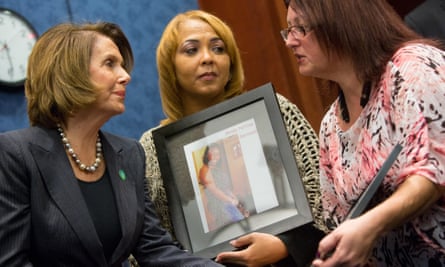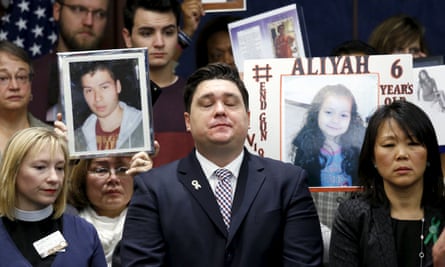Barack Obama has ordered officials to draw up an urgent new plan to strengthen background checks on gun buyers without the approval of Congress.
The president has asked his advisers to complete a proposal and submit it for his review, White House adviser Valerie Jarrett said.
“The president has directed his team in short order to finalise a set of recommendations on what more the administration can do on its own to save lives from gun violence, and those recommendations will include making sure we do everything we can to keep guns out of the wrong hands, including those expanded background checks,” Jarrett told a national gun violence vigil in Washington.
After the mass shooting in Roseburg, Oregon in October, Obama indicated he was looking for ways to boost gun laws without a vote in Congress.
On Thursday, the White House spokesman, Josh Earnest, said the review that Jarrett referred to had been under way for “the past couple of months” but claimed there was now increased appetite for fresh reform attempts among the US public in the recent weeks.
“These are essentially recommendations that the president has asked for from his staff based on their review of available executive authority,” Earnest told reporters on Thursday.
“The working assumption of this ongoing review is that Congress hasn’t acted and that’s been the source of immense frustration on the part of the president,” he added. “So given the congressional inaction, the question that’s been raised is what more can the Obama administration do, and that’s the substance of this review.”
White House officials have said they are exploring closing the so-called gun show loophole that allows people to buy weapons at gun shows and online without a background check.
Earnest also revealed that the vice-president, Joe Biden, had been in conversation with state and local politicians across the US to encourage them to take more unilateral steps to curb gun sales too.
“We have been actively engaged with leaders across the country about steps they can take to protect their communities from gun violence,” he said.
Jarrett told Wednesday night’s vigil: “Americans are mobilising. Two weeks ago I met at the White House with a group of gun owners who believe in the need for change. Many were former NRA [National Rifle Association] members who made clear to me that the NRA no longer represents them, and they assured me that many more gun owners were feeling the same.”
Separately on Thursday, Connecticut’s governor, Dan Malloy, announced that he would sign an executive order to bar people on the government’s terrorism watch lists from buying guns in the state. The move came ahead of next week’s third anniversary of the shooting of 20 young children and six of their adult carers at Sandy Hook elementary school in Newtown, Connecticut.
Meanwhile, House Democrats have launched a fresh effort to take on the powerful gun lobby, demanding an end to a 17-year ban on government-funded research into violence involving firearms. Nancy Pelosi, the House minority leader, announced the initiative on Thursday at an emotional press conference at Capitol Hill in Washington.
Pelosi complained that America’s gun control debate has been skewed for years because of a lack of public data. She said Democrats will insist that the research ban, the work of former Republican congressman Jay Dickey, be removed from law as part of the $1.1tn omnibus bill that Congress needs to pass by next week to avoid a government shutdown.

Dickey himself has since admitted that he was wrong about the measure, Pelosi said. “We must insist that we cannot have a bill leave the station that still has that ban on research in it,” she added to applause. “Our priority is to remove the ban on research on gun violence. Let’s do it today.”
Pelosi declined to comment directly on whether the measure would be a dealbreaker for the crucial budget. “This is something that has universal acceptance, so let us take it one step at a time,” she replied. “The bill has so many problems, they should welcome this as a gift … It would be the easiest thing in the world for them to take that piece of legislation out of the bill, and then we could find out. Why would we not want data, why would we not want information, so we can make a judgment about how we move forward?
“This bill today would say to the NRA you no longer have a stranglehold on information, on data, on research, on how we can make the change that is necessary. Once we have the data, we are better prepared to act upon it.”
‘We face a public health crisis’
Three years after Sandy Hook, Democrats have got nowhere with proposed measures to strengthen background checks on gun buyers, stop people on the FBI’s no-fly list from purchasing firearms or create a select committee on the issue, while the same period has seen an estimated 90,000 gun deaths and more than 1,000 mass shootings. The Dickey amendment, they believe, provides a more tangible and achievable target.
Speaking at Thursday’s press conference, Senator Richard Blumenthal of Connecticut said: “Drawing this line and saying this measure and its removal is a priority is profoundly significant. The gun lobby has a stranglehold … and one of their arguments is, ‘You don’t have the facts, you don’t have data.’ The reason there’s no data is this prohibition against the United States of America collecting facts and research.
“In a public health crisis, the most important treasure is facts, knowledge, evidence. We face a public health crisis. If the Center for Disease Control were prohibited from collecting information about Ebola, think of the outcry. That’s in effect what we are doing here. We are prohibiting the United States from getting information about a lethal threat to the people of America.”
Blumenthal added: “Thirty thousand people falling sick as a result of a public epidemic, dying as a result, is a public health crisis. We have in this nation, truly, an epidemic of gun deaths and gun disease that is taking lives – 90 of them – every day, and should be treated as a public health crisis.”
The politicians were joined by dozens of survivors and victims’ family members holding photos of men, women and children slain by guns. One mother broke down at the podium and could then be heard sobbing in a corridor. Pelosi, clearly moved, placed a comforting hand on her arm.
Along with still raw grief, families and politicians expressed rising anger at Congress’s failure to pass any legislation three years after Sandy Hook.
Christian Heyne, 29, whose mother was made to beg for her life before being killed by a gunman a decade ago, held a up a picture of her said: “This is what gun violence looks like. This is my mother and this is a picture that I gave to her on one of the last trips we took together. Gun violence looks like my wedding day when as I’m watching my wife walk down the aisle, and as it’s one of the most emotional days of my life, I know that my mom will never know who she is, she’ll never know my wife.
“Gun violence to me is knowing that when I have children, they will never know their grandmother. Gun violence is just knowing that when I want to hop on the phone and give her a call to tell her how my day want, I’ll never have that opportunity again. That’s what gun violence looks like and that’s what the cost of inaction is.”

Charged with emotion, Senator Chris Murphy, also from Connecticut, said thoughts and prayers are not meaningless, “but my religion involves partnering faith with action. What I believe is that it isn’t enough any longer to just say we care; you have to do something to show you care. And while we have disagreements about whether the right response is a ban on military-style assault weapons or more protections to make sure criminals don’t get guns or a fix to our broken mental health system, the one option that we cannot take is to do absolutely nothing, and that’s what we’ve done.
“In the wake of the slaughter of 20 little first-graders in Newtown, Connecticut, and the slaughter of 80 more every single day, Congress has done absolutely nothing. And that’s maybe what’s most offensive to me. Behind me are dozens of grieving families, and by this time tomorrow there will be 80 other families who could join them in this room, and 80 more the day after. How cold-hearted is this place to look these families in the eye and do absolutely nothing?”
He added: “It’s time for us to figure out what message we can send that we’re serious about this and to end a silence that has made Congress complicit in these ongoing murders.”

Comments (…)
Sign in or create your Guardian account to join the discussion